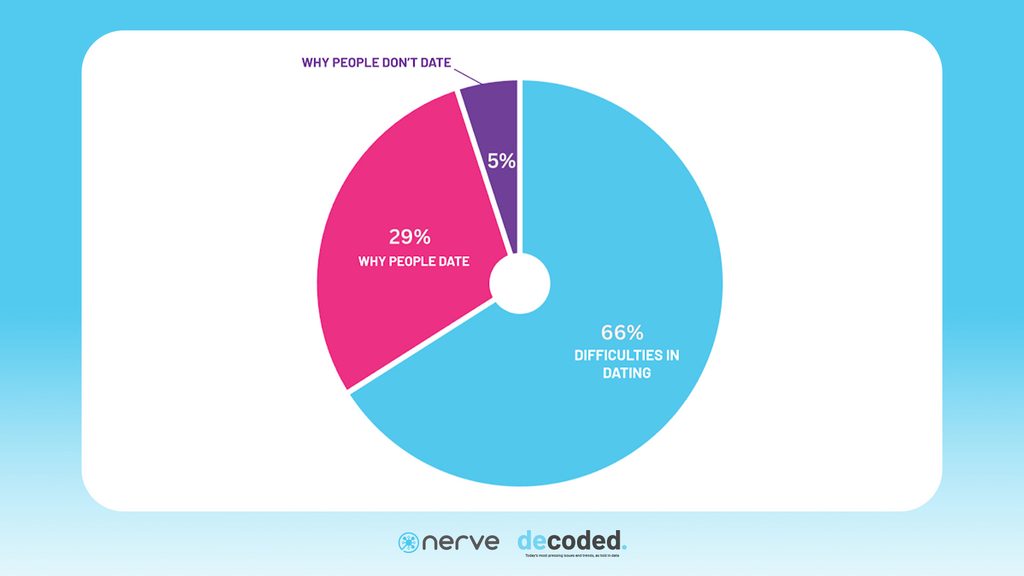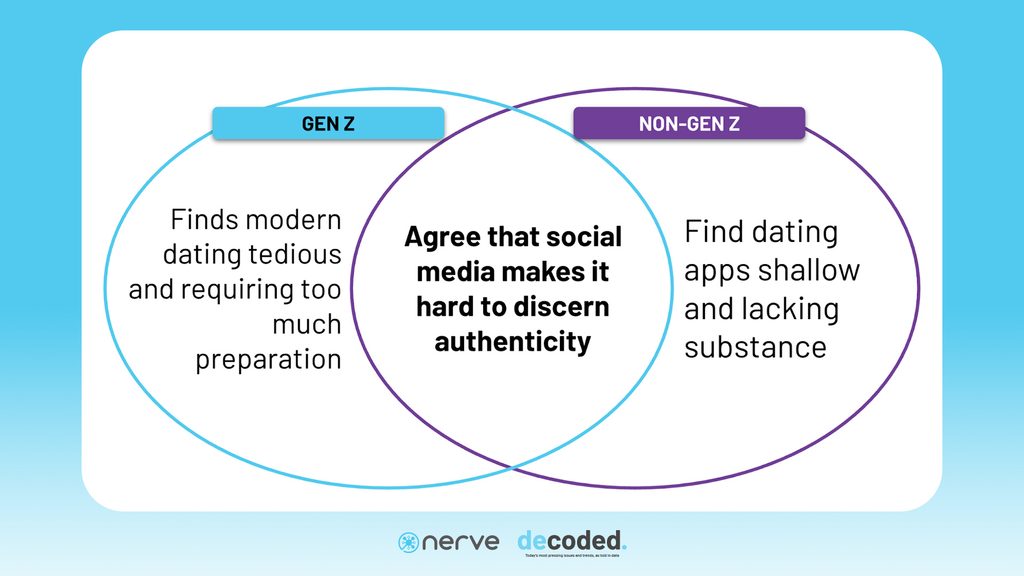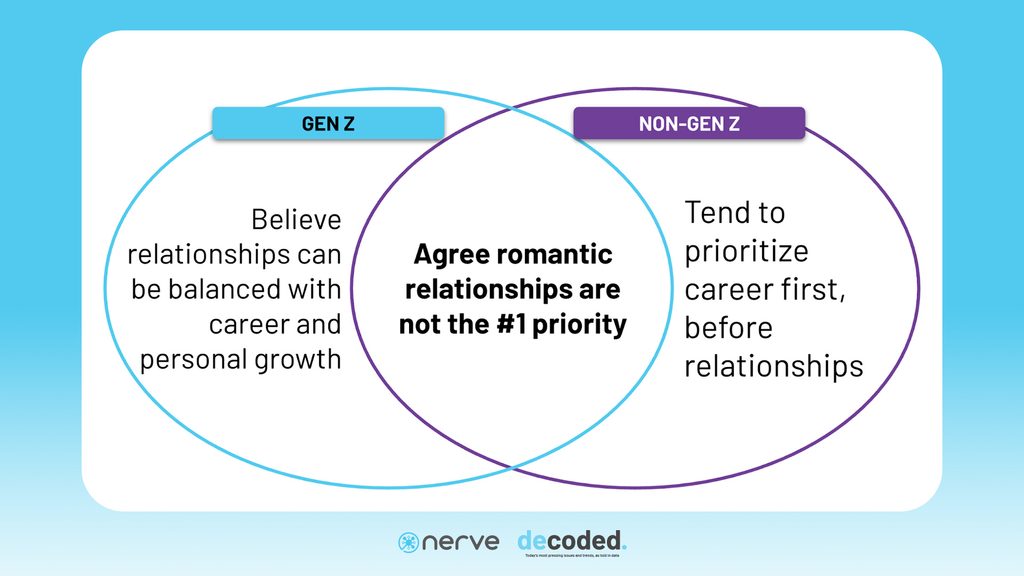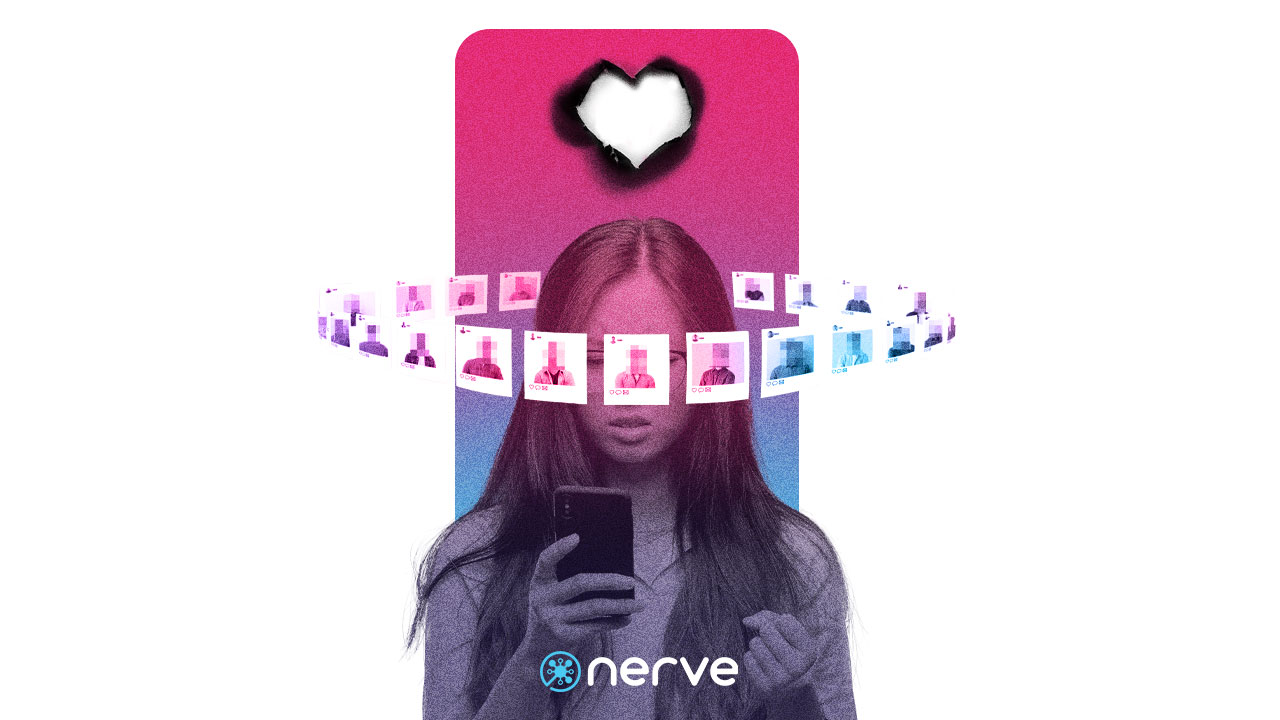[DECODED] Swipe, sigh, repeat: Why Gen Z is burning out on modern dating
Read more
Fatigued by shallow dating apps and performative social media, Gen Z is choosing to build careers and personal well-being instead of searching for a partner
Whenever people learn that a Gen Z like me is currently not dating, they always ask why. I'm a private person and find the question intrusive, so I usually give a simple answer: I'm a homebody who seldom goes out and has fewer opportunities to meet new people.
But someone will almost always be unsatisfied with that answer and press me to use dating apps. That suggestion falls flat for me. I tried using them in college at my friends' encouragement, and after just 10 swipes, I had completely lost interest.
So now, I am more direct: I am not interested in a relationship.
Social media seems to put so much importance on being in a relationship that I sometimes feel pressured to be in one. Fortunately, finding other single people who share my views has lessened that pressure and validated my decision. But this also made me wonder if my experience was part of a larger trend, which is exactly what we at The Nerve decided to investigate.
To explore this, we used Synth, our AI-powered interview platform, to conduct a qualitative "dipstick" study. Our goal wasn't to produce statistically representative data, but rather to uncover the personal narratives and themes shaping the modern dating scene. For this, we garnered responses from 79 people — 35 of whom were Gen Zs — to get a valuable snapshot of the attitudes within this group.
Dating in the age of social media
Our respondents show that technology has fundamentally changed the dating landscape, and not necessarily for the better. People are now adept at curating their social media presence, which makes discerning authenticity a significant challenge. This also pressures them to do the same to improve their chances of success in their dating life.
One 23-year-old Gen Z male felt that the focus has shifted from genuine connection to performance.
"I think it's become harder compared to before, where you aren't really focused on the connection, but more so if you live up to the dating conventions one would see on social media." - 23-year-old male, Gen Z
"The influence of social media has made dating more performative for some, with curated versions of relationships influencing expectations…" - 28-year-old male, Gen Z
This influence can make dating feel more performative, with online portrayals setting unrealistic expectations. Gen Zs, in particular, pointed to other problems arising from online dating, such as mixed signals and uncertainty about the other person's intentions. A 25-year-old female described a "classic mind game."
"I observe that you might sometimes say you’re busy but still stay active online — it’s a subtle way to test how much the other person will chase or wait. That kind of mixed signals feels like a classic mind game to me." - 25-year-old female, Gen Z
"For example, [the] internet said that women expect men or their partner to read their minds and give exactly what they want. It also comes with the phrase 'If he wanted to, he would.'" - 25-year-old male, Gen Z
Respondents also shared that the sheer volume of potential partners on dating apps can lead to decision fatigue and foster a mindset that their partners are replaceable.
"…That abundance [of options] often creates paradox-of-choice fatigue, ghosting culture, and a feeling that everyone’s replaceable if they’re not perfect right away." - 28-year-old male, Gen Z
Despite these challenges, only 5 of the 35 Gen Z respondents said they are not actively dating.
Putting ‘me’ before ‘we’: Gen Z’s new priorities
When the Gen Z respondents were asked where they would put romantic relationships among their priorities, only four said they were at the top of their list. Another five said they were a high priority among others.
For the majority, romance takes a backseat.
Nearly two-thirds (23 out of 35) described romantic relationships as a low priority, with their self-defined life goals coming first. Single Gen Zs are focused on nurturing their pre-existing social connections, spend more time on their hobbies and interests, and take the time to know themselves better. A few even cited achieving their career goals before going into a relationship.
"I don’t see myself having relationships yet, so I tend to prioritize building and strengthening my connections [with] my friends and colleagues." - 21-year-old male, Gen Z
However, this doesn't mean they've completely sworn off love. Many single Gen Zs believe balancing a relationship with other aspects of life is achievable and remain open to the possibility.
"Other aspects get to get more priority, but I don't want relationships to be more important than I want." - 23-year-old male, Gen Z
Another respondent expressed a similar sentiment, showing an openness to love even if it's not the primary focus.
"Not much [of a priority], but not to the point where I'll ignore potential opportunities to get into a relationship." - 23-year-old male, Gen Z
In contrast, coupled-up Gen Zs put relationships high on their list of priorities, though not at the very top. They emphasized the need to balance love with their career and families, and said that it is important for them that romantic relationships do not hinder their personal growth.
A generational divide?
Difficulties in the modern dating scene are not unique to Gen Z. Two-thirds (52) of all the respondents said they have experienced difficulties, attributing them to new ways of dating through the internet and their perceived inauthenticity in online dating.

Both Gen Zs and older generations, including millennials and Gen X, agree that social media is the biggest influence on modern dating. They find that the curation of social media profiles has made it harder to discern what’s for show and what’s real.
However, their frustrations manifest differently. While Gen Zs said social media has made modern dating feel more tedious, older generations were more vocal about their dislike for dating apps themselves.
"Dating these days is shallow. Dating apps are superficial and [lack] substance." - 32-year-old male, millennial
"[I] just let it happen. Tried dating apps before, and the whole process of getting to know [someone], engaging in small talk, is frankly too tiring." - 39-year-old female, millennial

Romantic relationships are also not the top priority across generations. What sets them apart is the degree to which relationships are prioritized in their lives.
Unlike Gen Zs, who try to balance other aspects of their lives with their love lives, older generations tend to put career goals at the top of their list. For some, their career goals must be fulfilled first before entering a romantic relationship for practical reasons.
But like Gen Zs, there were also respondents from older generations who said they are not excluding the possibility of entering a relationship, saying that they can balance their relationship with their career.
"My personal career is the priority, of course. [I] need to be secured first so I'll be stable in our relationship." - 31-year-old male, millennial
"Mas important ang career. I have no time for love, I only have time for money." - 40-year-old female, millennial
"[My top priorities are] personal well-being, both physically and mentally, building my career through graduate school, and nurturing long-term friendships." - 40-year-old female, millennial

These differences highlight how Gen Zs are recognizing the importance of a relationship, but do not view it as the ultimate marker of success. Their reluctance to enter a relationship and their perceived fatigue with the modern dating scene reflect a more cautious and pragmatic approach to dating.
Meanwhile, the focus of older generations on their career highlights their skepticism towards new dating technologies that prioritize gamification and increased options over authenticity.
Not just dating fatigue
The responses show a worrying trend in modern dating: more options seem to result in less satisfaction. As I researched further, I found several factors that could be contributing to this.
Technology, while helping us stay connected with friends and family and providing more dating options, has played a significant role in this trend. It can also negatively impact our self-image, and its excessive use can cause loneliness.
The COVID-19 pandemic magnified this social isolation by making us more reliant on social media, which has had documented negative impacts on mental health. This likely fuels the common gripe of inauthenticity when people talk about online dating.
The low priority for romantic relationships and focus on career also hints at the current economic climate, where financial stability is often seen as more important than emotional fulfillment.
This fatigue from dating can also be harmful. A study shows that singlehood can be a double-edged sword: while preference for being single results in a happier outlook, those who view relationships as more important were generally rated to have worse well-being.
I hope that with these conversations, more people will understand that for some, singlehood is not forced solitude, but a valid choice that provides freedom to those who choose it. – Rappler.com
Decode your audience’s psyche using the unparalleled speed and scale of Synth AI-powered Surveys and Interviews, with hard-hitting insights brought to you by The Nerve’s data experts. Email hello@thenerve.co for inquiries.
This story was originally published on Rappler on October 9, 2025.
Decoded is a Rappler series that tackles Big Tech not just as a system of abstract infrastructure or policy levers, but as something that directly shapes human experiences. It is produced by The Nerve, a data forensics company that enables changemakers to navigate real-world trends and issues through narrative and network investigations. Taking the best of human and machine, we enable partners to unlock powerful insights that shape informed decisions. Composed of a team of data scientists, strategists, award-winning storytellers, and designers, the company is on a mission to deliver data with real-world impact.






